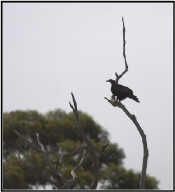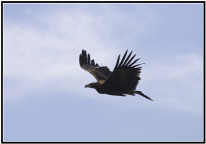Western Water Media Release - 11 January 2007.
Photographs by Sonja Ross.
 Pinkerton Forest, a rare woodland reserve in Melton Shire, has a new resident – a baby wedge-tailed eagle.
Pinkerton Forest, a rare woodland reserve in Melton Shire, has a new resident – a baby wedge-tailed eagle.
The discovery has surprised zoologists and delighted environmentalists who manage the “island of biodiversity” located only several kilometres from Melton township.
The baby eagle has left its nest atop one of the forest’s large grey-box, and has been sighted in flight. But it is expected to leave the area shortly to establish its own territory, possibly up to 200km away.
Generally, adults raise only one chick a year. Wedge-tails are the world’s fourth largest eagle, with males growing to nearly 3kg and females 4kg. The species are found in open woodlands and grasslands and feed on rabbits, hares, carrion, lizards and waterfowl.

Ecology Australia zoologist Emma Moysey has hailed the find as an event of regional significance
“Certainly, the species are uncommon within Greater Melbourne. Pinkerton Forest, however, is one of the few remnant areas of woodland remaining in the area and, therefore, provides an ideal opportunity for nesting,” she reports.
The discovery was made by ecologist Lawrie Conole, of Ecology Australia, while conducting a biodiversity assessment of the forest.
Managed by the Pinkerton Landcare Environment Group on behalf of Western Water, the 35-hectare reserve forms part of Surbiton Park, home of Western Water’s Melton recycled water plant.

The forest was recently expanded and fenced to preserve what is widely recognised as an environment unique to the volcanic plains of Western Victoria.
The reserve is complemented by nearby woodlands known as Bush’s Paddock and the Eynesbury Station grey-box forest. Bush’s Paddock is managed by Melton council and the Landcare group and is covered by a Trust for Nature covenant for its biodiversity value.
As well as grey-box, Pinkerton Forest features native grasses and shrubs, wild flowers, wattles and rare fungi. Landcare volunteers, in consultation with Western Water, have been restoring the area, with wildlife beginning to return to the previously overgrazed site.

Pinkerton Landcare Environment Group secretary Daryl Akers said members were delighted their efforts were being rewarded.
“Not only are grey box seedlings and native shrubs beginning to appear, but wildlife is giving the rejuvenated area their tick of approval by setting up home.
“This is proof positive of the value of retaining areas of natural bushland – and it shows
Melton can boast areas of natural beauty and significance,” he said.
Pinkerton Forest is the burial place of five members of the pioneering Pinkerton family, who farmed the area in the 1850s. Their graves in a secluded section of the forest are marked by a memorial cairn.
